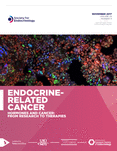Stem cells in genetically-engineered mouse models of prostate cancer
- Departments of Medicine, Genetics and Development, Urology, and Systems Biology, Herbert Irving Comprehensive Cancer Center, Columbia University Medical Center, New York, New York 10032, USA
- Correspondence should be addressed to M M Shen; Email: mshen{at}columbia.edu
Abstract
The cancer stem cell model proposes that tumors have a hierarchical organization in which tumorigenic cells give rise to non-tumorigenic cells, with only a subset of stem-like cells able to propagate the tumor. In the case of prostate cancer, recent analyses of genetically engineered mouse (GEM) models have provided evidence supporting the existence of cancer stem cells in vivo. These studies suggest that cancer stem cells capable of tumor propagation exist at various stages of tumor progression from prostatic intraepithelial neoplasia (PIN) to advanced metastatic and castration-resistant disease. However, studies of stem cells in prostate cancer have been limited by available approaches for evaluating their functional properties in cell culture and transplantation assays. Given the role of the tumor microenvironment and the putative cancer stem cell niche, future studies using GEM models to analyze cancer stem cells in their native tissue microenvironment are likely to be highly informative.
- Revision received 27 August 2015
- Accepted 4 September 2015
- Made available online as an Accepted Preprint 4 September 2015
- © 2015 Society for Endocrinology












